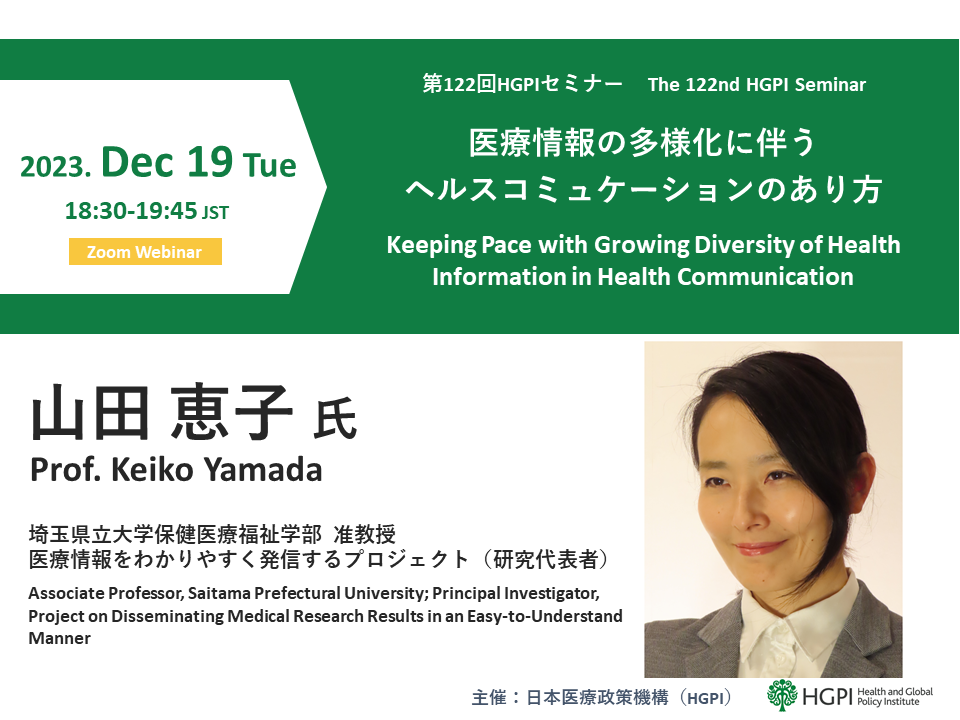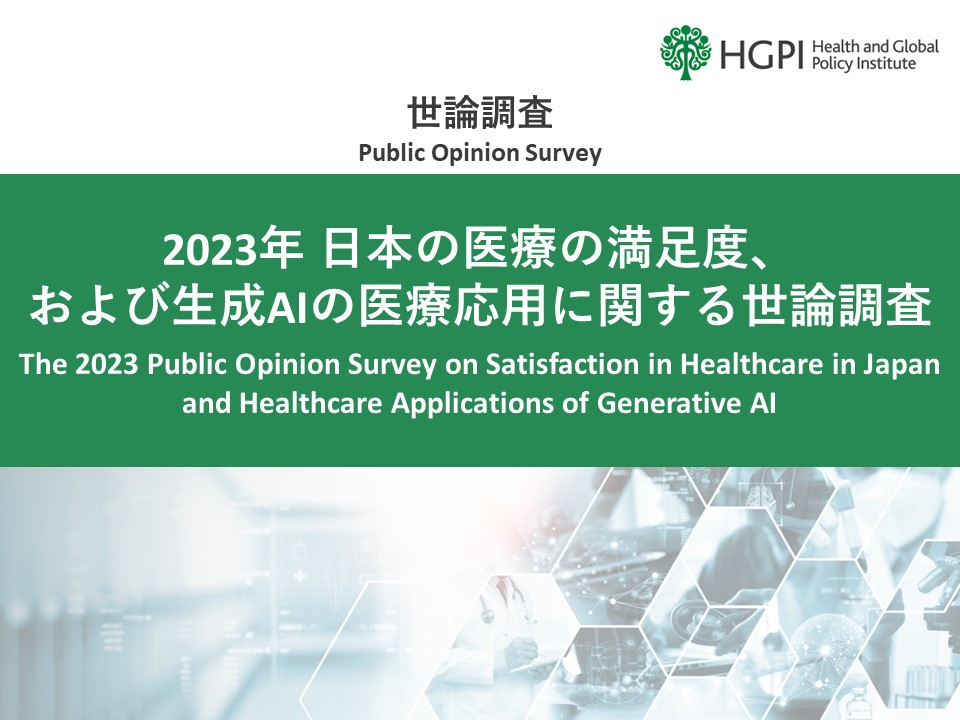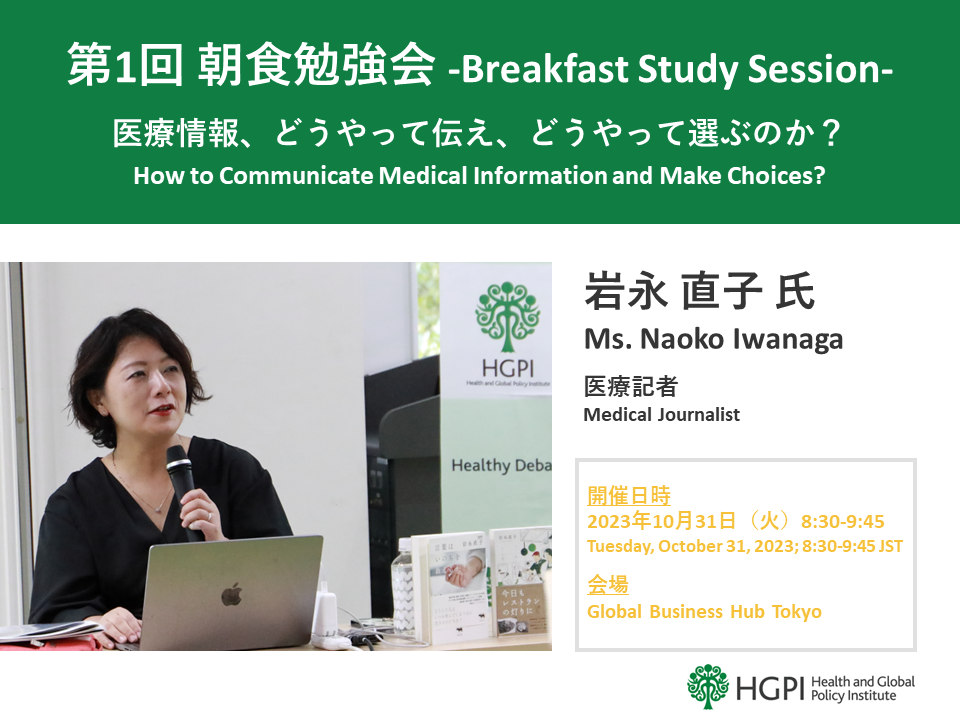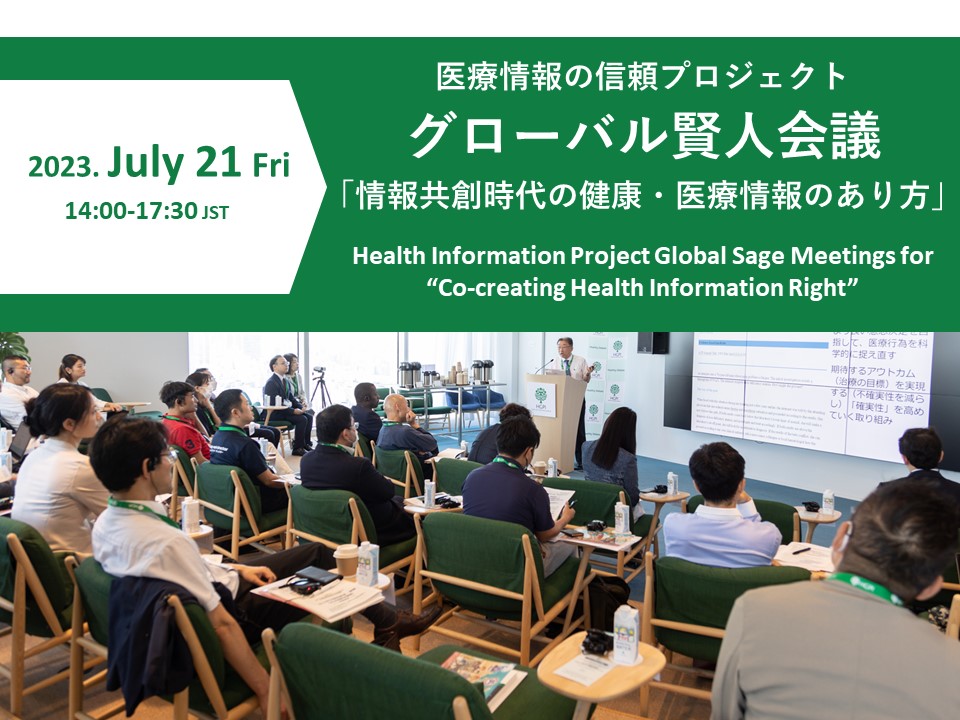[Activity Report] Health Information Project Global Sage Meetings for “Co-creating Health Information Right” (April 22, 2024)
date : 4/22/2024
Tags: Health Information
![[Activity Report] Health Information Project Global Sage Meetings for “Co-creating Health Information Right” (April 22, 2024)](https://hgpi.org/en/wp-content/uploads/sites/2/hi-20240422-top.png)
The Health and Global Policy Institute (HGPI) Health Information Project hosted a Global Sage Meeting entitled, “Co-creating Health Information Right.”
Recognizing the movement toward information digitalization in recent years and the fact that health information can directly impact health, HGPI held two meetings with health professionals, representatives of Government and industry, patients and patient advocate leaders, and experts in fields like philosophy, religion, and informatics for a global and multidisciplinary discussion on the nature of health information.
■The First Sage Meeting: The accuracy and reliability of health information
Keynote Lecture 1: Co-creating Health Information Right
Takeo Nakayama (Professor, Department of Health Informatics, School of Public Health, Kyoto University)
Professor Nakayama’s lecture examined the ideal structure of information surrounding health in the future and the nature of evidence based on the concept of health communication in Shared Decision Making (SDM), which is a necessary element in healthcare decision-making due to the multifaceted nature of information exchange in the modern era.
Keynote Lecture 2: Information as a Determinant of Health in the Modern Era
Garth Graham (Director and Global Head, Healthcare and Public Health, Google/YouTube)
Mr. Garth Graham, Director and Global Head of Healthcare and Public Health at YouTube, a video content platform used by billions of people today. Mr. Graham discussed the challenges and social responsibilities of platform operators given the widespread popularity of video content and highlighted current efforts to address those challenges.
Discussion
The discussion portion of the meeting looked back on the COVID-19 pandemic to examine issues related to accurate health information, which were shared from the perspectives of both information providers and recipients. Effective measures to bridge the gaps between these two parties were also discussed. Another theme of the discussion was the reliability and validity of information, with a close look at fundamental topics such as how individuals think, how society should position itself in the face of health information, and the characteristics of health information. Through this discussion, we were able to examine the true nature of health information as a social issue.
■The second Sage Metting: Ideal methods of transmitting and receiving health information
Keynote Lecture 3: The Nature of Communication Through the Lens of the COVID-19 Pandemic and Related Topics
Shigeru Omi (Chairman, Japan Anti-Tuberculosis Association)
Dr. Shigeru Omi gave a keynote lecture in which he reflected on his position as a specialist during the COVID-19 pandemic and explored various topics, such as the balance between dialogue with the Government and the dialogue with the public during each phase of the pandemic.
Discussion
During the discussion, participants examined effective methods of communicating information and shared more specific methods of doing so, with a particular focus on items for information transmitters to keep in mind regarding the characteristics of health information, their responsibilities, and precautions for providing information. Among the items covered in that discussion, one of the most significant points raised was the need for the media and the Government to build a system for cooperation in the near future to establish the capacity to rapidly provide accurate information during emergencies. As Japan frequently experiences natural disasters and other crises, this must be done in advance, before emergency situations arise. The meeting concluded with a discussion on necessary concepts within information co-creation in modern society, where all citizens are frequently in contact with health information.
The discussions at these two meetings allowed us to discuss the nature of health information as a social issue that requires examination from both a medical perspective as well as the perspective of human nature. Our discussions were not held with the purpose of reaching a conclusion or for recommending solutions; rather, our objective was to crystallize and gather opinions and perspectives from a wide variety of positions. This report was also compiled based on this concept. We sincerely hope it serves as a useful reference for future discussions on health information.
[Event Overview]
- The 1st Event: Friday, July 21, 2023; from 14:00 to 17:30 JST
- The 2nd Event: Wednesday, October 25, 2023; Fron 14:00 to 17:30 JST
- Venue: Event Space in Google Japan G.K. (Tokyo)
Meeting participants (Titles omitted; in Japanese syllabary order. All titles and affiliations are current as of the dates of the meetings.)
Ichio Aoki (Senior Principal Investigator, Institute for Quantum Medical Science (iQMS), National Institutes for Quantum Science and Technology (QST).)
Shinsuke Amano (Board Chairman of Japan Federation of Cancer Patient Groups)
Hirono Ishikawa (Professor, Teikyo University Graduate School of Public Health)
Mamoru Ichikawa (Representative, Association of Medical Journalism)
Ryu Inomata (Person living with heart disease, Help Mark Awareness Worker in Nagano Prefecture)
Naoko Iwanaga (Freelance Medical Journalist)
Norio Ohmagari (Director, Disease Control and Prevention Center (DCC) of National Center for Global Health and Medicine (NCGM); Director and Chief, International Center for Infectious Diseases; Chief Medical Officer, Department of Infectious Diseases, Disease Control and Prevention Center of NCGM)
Mariko Ogawa (Associate Professor, Department of Obstetrics and Gynecology Ichikawa General Hospital Tokyo Dental College)
Shigeru Omi (Chairman, Japan Anti-Tuberculosis Association)
Junko Kitanaka (Professor, Department of Humanities and Sociology (Human Sciences), Faculty of Letters, Keio University)
Satoshi Kutsuna (Professor, Department of Infection Control and Prevention, Graduate School of Medicine/Faculty of Medicine, Osaka University)
Keigo Kobayashi (Person living with a mental disorder)
Naomi Sakurai (President, Cancer Solutions Co., Ltd.)
Yuya Shibuya (Associate Professor, Division of Joint Usage and Research, Center for Spatial Information Science, The University of Tokyo)
Takeshi Shukunobe (CEO, PPeCC)
Rami Suzuki (President and Representative Director, Moderna Japan)
Tomohisa Sumida (Visiting Research Fellow, Graduate School of Human Relations, Keio University)
Atsushi Sorita (Partner, McKinsey & Company)
Soichiro Toda (Project Researcher, Graduate School/Faculty of Arts and Letters, Tohoku University)
Akiko Nakajo (Managing Director, YouTube Japan, Google Japan G.K.)
Takeo Nakayama (Professor, Department of Health Informatics, School of Public Health, Kyoto University)
Daisuke Furuta (Journalist; Chief Editor, Japan Fact-check Center (JFC); a founder of Media-Collabo)
Shoukei Matsumoto (Ancestroist; CEO & Co-Founder, Interbeing, Inc.; Young Global Leader, World Economic Forum)
Kengo Miyo (Chair of Nursing Informatics Committee, Japan Association for Medical Informatics/ Chief Medical Informatics Officer, National Center for Global Health and Medicine)
Masafumi Motomura (Professor, Graduate School of Interdisciplinary Science and Engineering in Health Systems, Okayama University)
Keiko Yamada (Associate Professor, Saitama Prefectural University; Principal Investigator, Project on Disseminating Medical Research Results in an Easy-to-Understand Manner)
Kensuke Yoshimura (Professor, Center for Next Generation of Community Health, Chiba University Hospital; Executive secretary, COV-Navi)
Garth Graham (Head of YouTube Health)
Project sponsors (in alphabetical order)
Google Japan G.K.
National Graduate Institute for Policy Studies (GRIPS) Global Health Innovation Policy Program
Moderna Japan Co., Ltd.
Top Research & Recommendations Posts
- [Policy Recommendations] Developing a National Health and Climate Strategy for Japan (June 26, 2024)
- [Announcement] A Turning Point Towards Building Green Healthcare Systems (June 5, 2024)
- [Research Report] Building a Mental Health Program for Children and Measuring its Effectiveness (June 16, 2022)
- [Research Report] 2019 Survey on Healthcare in Japan
- [Research Report] The 2023 Public Opinion Survey on Satisfaction in Healthcare in Japan and Healthcare Applications of Generative AI (January 11, 2024)
- [New Report] Policy Priorities for Super-Ageing Japan: Health Innovation and Economic Growth in the COVID-19 Pandemic Era (February 24, 2021)
- [Research Report] Survey of Japanese Physicians Regarding Climate Change and Health (December 3, 2023)
- [Policy Recommendations] Obesity Control Promotion Project 2023 “The Next Steps for Engaging and Cooperating with Patients, Citizens, and Communities for Implements of Obesity Control Measurements” (April 8, 2024)
- [Reserch Report] Survey of Japanese Nursing Professionals Regarding Climate Change and Health (Final Version) (November 14, 2024)
- [Policy Recommendations] Kidney Disease Control Promotion Project 2023 “Establishing Kidney Disease Control Measures with Patient, Citizen, and Community Engagement and Collaboration” Policy Recommendations, a Collection of Good Practices of Chronic Kidney Disease (CKD) and Control Measures in Local Governments (February 14, 2024)
Featured Posts
-
2024-10-28
[Registration Open] (Hybrid Format) Public Symposium “Promoting CVD Control Based on the Needs of People Living with or Affected by Cardiovascular Diseases: Towards Effective Implementation of the Second Phase CVD Control Plans” (November 22, 2024)
![[Registration Open] (Hybrid Format) Public Symposium “Promoting CVD Control Based on the Needs of People Living with or Affected by Cardiovascular Diseases: Towards Effective Implementation of the Second Phase CVD Control Plans” (November 22, 2024)](https://hgpi.org/en/wp-content/uploads/sites/2/cvd-ncd-20241122-top.png)
-
2024-11-01
[Registration Open] Designing for Dementia Briefing Session 2024 – Conversations on the Trajectory of Our Activities and Envisioning the Future (December 3, 2024)
![[Registration Open] Designing for Dementia Briefing Session 2024 – Conversations on the Trajectory of Our Activities and Envisioning the Future (December 3, 2024)](https://hgpi.org/en/wp-content/uploads/sites/2/dementia-20241203-top.png)
-
2024-11-11
[Discussion Points] Women’s Health Project Expert Meeting “The Ideal System for Perinatal Medical Care in Japan in the Era of Declining Birth Rates” (November 11, 2024)
![[Discussion Points] Women’s Health Project Expert Meeting “The Ideal System for Perinatal Medical Care in Japan in the Era of Declining Birth Rates” (November 11, 2024)](https://hgpi.org/en/wp-content/uploads/sites/2/wh-20241111-top_ENG.png)
-
2024-11-11
[Registration Open] (Hybrid Format) Obesity Control Promotion Project Public Symposium “Obesity Control as a Social Issue; Toward the Realization of Citizen-Centered Policies” (December 4, 2024)
![[Registration Open] (Hybrid Format) Obesity Control Promotion Project Public Symposium “Obesity Control as a Social Issue; Toward the Realization of Citizen-Centered Policies” (December 4, 2024)](https://hgpi.org/en/wp-content/uploads/sites/2/HGPI_20241107_FY2024ObesitySymposium_eyecatch.jpg)
-
2024-11-14
[Reserch Report] Survey of Japanese Nursing Professionals Regarding Climate Change and Health (Final Version) (November 14, 2024)
![[Reserch Report] Survey of Japanese Nursing Professionals Regarding Climate Change and Health (Final Version) (November 14, 2024)](https://hgpi.org/en/wp-content/uploads/sites/2/HGPI_20241112_PH_EyeCatch.png)








